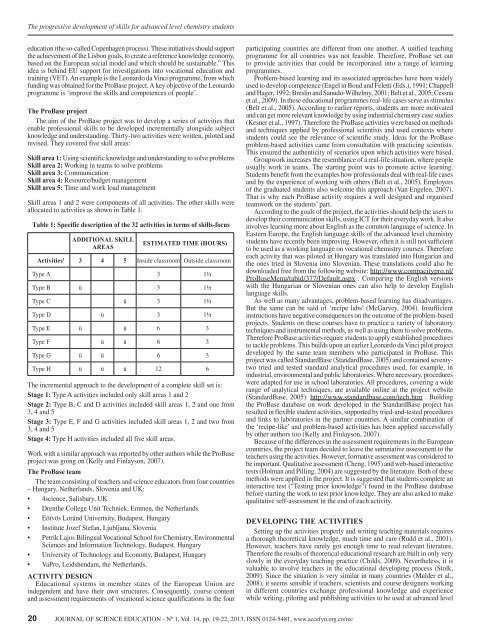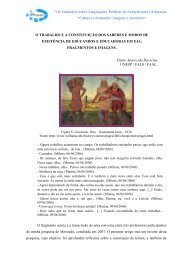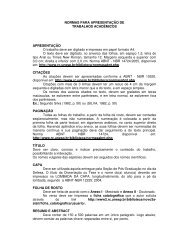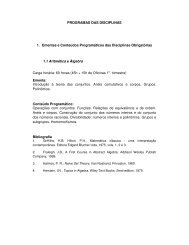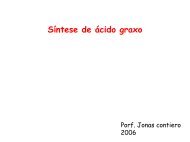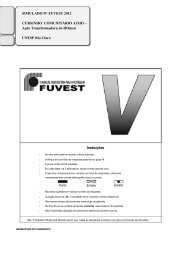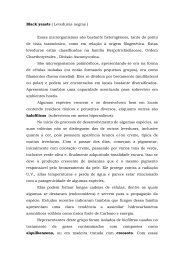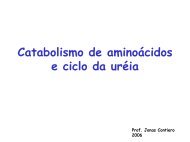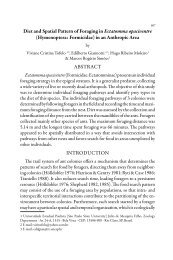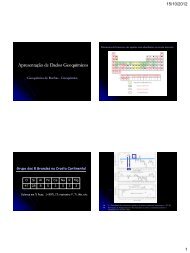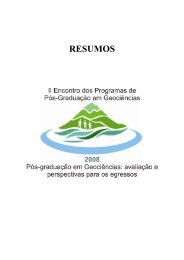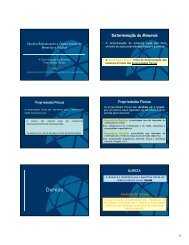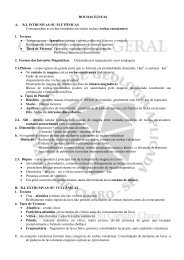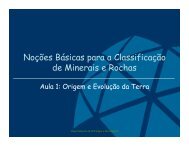Vol. 14 N° 1, 2013 - UNESP Rio Claro
Vol. 14 N° 1, 2013 - UNESP Rio Claro
Vol. 14 N° 1, 2013 - UNESP Rio Claro
You also want an ePaper? Increase the reach of your titles
YUMPU automatically turns print PDFs into web optimized ePapers that Google loves.
The progressive development of skills for advanced level chemistry students<br />
education (the so-called Copenhagen process). These initiatives should support<br />
the achievement of the Lisbon goals, to create a reference knowledge economy,<br />
based on the European social model and which should be sustainable.” This<br />
idea is behind EU support for investigations into vocational education and<br />
training (VET). An example is the Leonardo da Vinci programme, from which<br />
funding was obtained for the ProBase project. A key objective of the Leonardo<br />
programme is ‘improve the skills and competences of people’.<br />
The ProBase project<br />
The aim of the ProBase project was to develop a series of activities that<br />
enable professional skills to be developed incrementally alongside subject<br />
knowledge and understanding. Thirty-two activities were written, piloted and<br />
revised. They covered five skill areas:<br />
Skill area 1: Using scientific knowledge and understanding to solve problems<br />
Skill area 2: Working in teams to solve problems<br />
Skill area 3: Communication<br />
Skill area 4: Resource/budget management<br />
Skill area 5: Time and work load management<br />
Skill areas 1 and 2 were components of all activities. The other skills were<br />
allocated to activities as shown in Table 1.<br />
Table 1: Specific description of the 32 activities in terms of skills-focus<br />
ADDITIONAL SKILL<br />
AREAS<br />
ESTIMATED TIME (HOURS)<br />
Activities 1 3 4 5 Inside classroom Outside classroom<br />
Type A 3 1½<br />
Type B ü 3 1½<br />
Type C ü 3 1½<br />
Type D ü 3 1½<br />
Type E ü ü 6 3<br />
Type F ü ü 6 3<br />
Type G ü ü 6 3<br />
Type H ü ü ü 12 6<br />
The incremental approach to the development of a complete skill set is:<br />
Stage 1: Type A activities included only skill areas 1 and 2<br />
Stage 2: Type B, C and D activities included skill areas 1, 2 and one from<br />
3, 4 and 5<br />
Stage 3: Type E, F and G activities included skill areas 1, 2 and two from<br />
3, 4 and 5<br />
Stage 4: Type H activities included all five skill areas.<br />
Work with a similar approach was reported by other authors while the ProBase<br />
project was going on (Kelly and Finlayson, 2007).<br />
The ProBase team<br />
The team consisting of teachers and science educators from four countries<br />
– Hungary, Netherlands, Slovenia and UK:<br />
• 4science, Salisbury, UK<br />
• Drenthe College Unit Techniek, Emmen, the Netherlands<br />
• Eötvös Loránd Univertsity, Budapest, Hungary<br />
• Institute Jozef Stefan, Ljubljana, Slovenia<br />
• Petrik Lajos Bilingual Vocational School for Chemistry, Environmental<br />
Sciences and Information Technology, Budapest, Hungary<br />
• University of Technology and Economy, Budapest, Hungary<br />
• VaPro, Leidshendam, the Netherlands.<br />
ACTIVITY DESIGN<br />
Educational systems in member states of the European Union are<br />
independent and have their own structures. Consequently, course content<br />
and assessment requirements of vocational science qualifications in the four<br />
participating countries are different from one another. A unified teaching<br />
programme for all countries was not feasible. Therefore, ProBase set out<br />
to provide activities that could be incorporated into a range of learning<br />
programmes.<br />
Problem-based learning and its associated approaches have been widely<br />
used to develop competence (Engel in Boud and Feletti (Eds.), 1991; Chappell<br />
and Hager, 1992; Breslin and Sanudo-Wilhelmy, 2001; Belt et al., 2005; Cessna<br />
et al., 2009). In these educational programmes real-life cases serve as stimulus<br />
(Belt et al., 2005). According to earlier reports, students are more motivated<br />
and can get more relevant knowledge by using industrial chemistry case studies<br />
(Kesner et al., 1997). Therefore the ProBase activities were based on methods<br />
and techniques applied by professional scientists and used contexts where<br />
students could see the relevance of scientific study. Ideas for the ProBase<br />
problem-based activities came from consultation with practicing scientists.<br />
This ensured the authenticity of scenarios upon which activities were based.<br />
Groupwork increases the resemblance of a real-life situation, where people<br />
usually work in teams. The starting point was to promote active learning.<br />
Students benefit from the examples how professionals deal with real-life cases<br />
and by the experience of working with others (Belt et al., 2005). Employers<br />
of the graduated students also welcome this approach (Van Engelen, 2007).<br />
That is why each ProBase activity requires a well designed and organised<br />
teamwork on the students’ part.<br />
According to the goals of the project, the activities should help the users to<br />
develop their communication skills, using ICT for their everyday work. It also<br />
involves learning more about English as the common language of science. In<br />
Eastern Europe, the English language skills of the advanced level chemistry<br />
students have recently been improving. However, often it is still not sufficient<br />
to be used as a working language on vocational chemistry courses. Therefore<br />
each activity that was piloted in Hungary was translated into Hungarian and<br />
the ones tried in Slovenia into Slovenian. These translations could also be<br />
downloaded free from the following website: http://www.compacitypro.nl/<br />
ProBaseMenu/tabid/377/Default.aspx . Comparing the English versions<br />
with the Hungarian or Slovenian ones can also help to develop English<br />
language skills.<br />
As well as many advantages, problem-based learning has disadvantages.<br />
But the same can be said of ‘recipe labs’ (McGarvey, 2004). Insufficient<br />
instructions have negative consequences on the outcome of the problem-based<br />
projects. Students on these courses have to practice a variety of laboratory<br />
techniques and instrumental methods, as well as using them to solve problems.<br />
Therefore ProBase activities require students to apply established procedures<br />
to tackle problems. This builds upon an earlier Leonardo da Vinci pilot project<br />
developed by the same team members who participated in ProBase. This<br />
project was called StandardBase (StandardBase, 2005) and contained seventytwo<br />
tried and tested standard analytical procedures used, for example, in<br />
industrial, environmental and public laboratories. Where necessary, procedures<br />
were adapted for use in school laboratories. All procedures, covering a wide<br />
range of analytical techniques, are available online at the project website<br />
(StandardBase, 2005): http://www.standardbase.com/tech.htm . Building<br />
the ProBase database on work developed in the StandardBase project has<br />
resulted in flexible student activities, supported by tried-and-tested procedures<br />
and links to laboratories in the partner countries. A similar combination of<br />
the ‘recipe-like’ and problem-based activities has been applied successfully<br />
by other authors too (Kelly and Finlayson, 2007).<br />
Because of the differences in the assessment requirements in the European<br />
countries, the project team decided to leave the summative assessment to the<br />
teachers using the activities. However, formative assessment was considered to<br />
be important. Qualitative assessment (Cheng, 1995) and web-based interactive<br />
tests (Holman and Pilling, 2004) are suggested by the literature. Both of these<br />
methods were applied in the project. It is suggested that students complete an<br />
interactive test (“Testing prior knowledge”) found in the ProBase database<br />
before starting the work to test prior knowledge. They are also asked to make<br />
qualitative self-assessment in the end of each activity.<br />
DEVELOPING THE ACTIVITIES<br />
Setting up the activities properly and writing teaching materials requires<br />
a thorough theoretical knowledge, much time and care (Rudd et al., 2001).<br />
However, teachers have rarely got enough time to read relevant literature.<br />
Therefore the results of theoretical educational research are built in only very<br />
slowly in the everyday teaching practice (Childs, 2009). Nevertheless, it is<br />
valuable to involve teachers in the educational developing process (Stolk,<br />
2009). Since the situation is very similar in many countries (Mulder et al.,<br />
2008), it seems sensible if teachers, scientists and course designers working<br />
in different countries exchange professional knowledge and experience<br />
while writing, piloting and publishing activities to be used at advanced level<br />
20 JOURNAL OF SCIENCE EDUCATION - Nº 1, <strong>Vol</strong>. <strong>14</strong>, pp. 19-22, <strong>2013</strong>, ISSN 0124-5481, www.accefyn.org.co/rec


